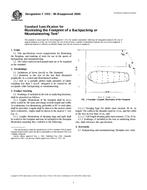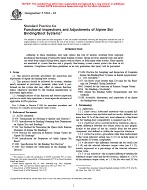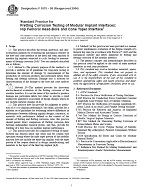1.1 This practice specifies procedures for determining the length and diameter of rock core specimens and the conformance of the dimensions with established standards.
1.2 Rock is a complex engineering material which can vary greatly as a function of lithology, stress history, weathering, and other natural geologic processes. As such, it is not always possible to obtain or prepare rock core specimens which satisfy the desirable criteria given in this practice. Most commonly, this situation presents itself with weaker, more porous, and poorly cemented rock types and rock types containing significant structural features. For these and other rock types which are difficult to prepare, all reasonable efforts shall be made to prepare a sample in accordance with this practice. However, when it has been determined by trial that this is not possible, prepare the rock specimen to the highest standard practicable and consider this to be the best effort and report it as such, with all appropriate size and dimensional measurements reported as in Section 6.
1.3 This practice also prescribes tolerance checks on the straightness of the elements on the cylindrical surface, the flatness of the end bearing surfaces, and the perpendicularity of the end surfaces with the axis of the core.
1.4 The requirement for specifying the moisture condition of the test specimen at the time of the test is also stated.
1.5 The values stated in inch-pound units are to be regarded as the standard. The SI units given in parentheses are for information only.
1.6 This standard does not purport to address all of the safety concerns, if any, associated with its use. It is the responsibility of the user of this standard to establish appropriate safety and health practices and determine the applicability of regulatory limitations prior to use.
1.7 This practice offers a set of instructions for performing one or more specific operations. This document cannot replace education or experience and should be used in conjunction with professional judgement. Not all aspects of this practice may be applicable in all circumstances. This ASTM standard is not intended to represent or replace the standard of care by which the adequacy of a given professional service must be judged, nor should this document be applied without consideration of a project’s many unique aspects. The word “standard” in the title of this document means only that the document has been approved through the ASTM consensus process.
Product Details
- Published:
- 06/10/2001
- Number of Pages:
- 5
- File Size:
- 1 file , 72 KB


